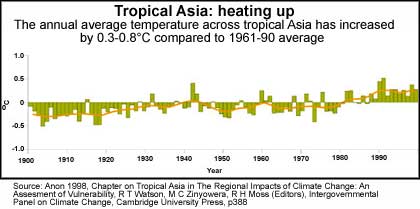Global Heat
 "(The heat waves) are initial signals of global warming,' says M Lal, chief scientific officer at the Centre for Atmospheric Studies at the Indian Institute of Technology, New Delhi. In future, the scenario could get worse, warns Lal. "One of the most easily imagined impacts of global warming is an increase in the number and severity of heat waves,' observes the World Resources 1998-99 , published by the World Resources Institute.
"(The heat waves) are initial signals of global warming,' says M Lal, chief scientific officer at the Centre for Atmospheric Studies at the Indian Institute of Technology, New Delhi. In future, the scenario could get worse, warns Lal. "One of the most easily imagined impacts of global warming is an increase in the number and severity of heat waves,' observes the World Resources 1998-99 , published by the World Resources Institute.
Qazi K Ahmed, an economist and chairperson of the Bangladesh Unnayan Parishad, a Dhaka-based non-governmental organisation, agrees. He and a colleague, Ahsan U Ahmed, presented a paper entitled Social Sustainability, Indicators and Climate Change at the Inter-governmental Panel on Climate Change's ( ipcc 's) meeting of experts in Colombo on April 27-29, 1998. "Although the climate change phenomenon is an extremely complex process, available evidence clearly suggests that global warming cannot but be an important reason (behind the heat wave),' he observes.
In his paper, which is still under revision, Ahmed anticipates that an increased frequency or severity of heat waves would cause an increase in human mortality and illness (see box: More death and disease ). General circulation modelling reveals that in a scenario where carbon dioxide concentrations are doubled, the number of heat related deaths would increase several fold in North America, North Africa and East Asia, Ahmed's paper points out. Increased frequency of other extreme weather events such as floods, hurricanes and storm surges would also result in increased deaths, physical injury, infectious diseases and psychological disorders, especially in disaster-prone countries.
Evidence of global warming
"1998 was the hottest year on record,' say three reports brought out by the us National Oceanic Atmospheric Administration ( noaa ), the us National Aeronautics and Space Administration ( nasa ), and the World Meteorological Organization ( wmo ). Ten of the warmest years on record have all occurred since 1983, with seven of them since 1990, according to wmo .
"There is no period we can recognise in the last 1,200 years that was as warm (as 1998) on a global basis,' wrote Jonathan Overpeck, a palaeontologist with noaa , in The Washington Post on December 8, 1998. "That makes what we are now seeing more unusual, and more difficult to explain without turning to a
Related Content
- Learning Interrupted: Global Snapshot of Climate-Related School Disruptions in 2024
- State of the climate in Latin America and the Caribbean 2023
- Recipe for a livable planet: achieving net zero emissions in the agrifood system
- Climate risks to nine key commodities: protecting people and prosperity
- Ensuring safety and health at work in a changing climate
- Annual climate summary 2023
